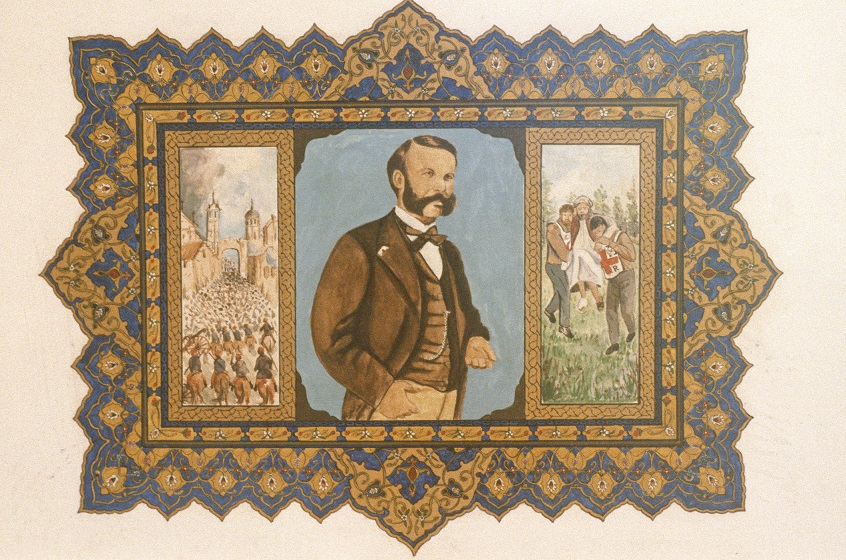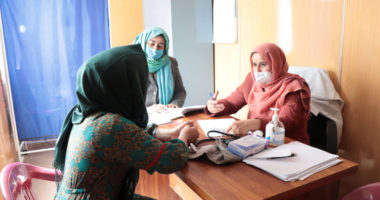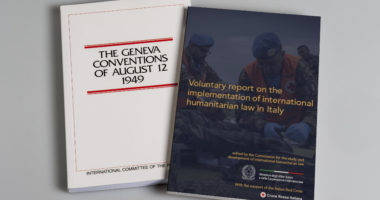This year marks the 160th anniversary of the publication of Henri Dunant’s classic text, ‘A Memory of Solferino’, in 1862. Dunant’s powerful book inspired the founding of the International Red Cross and Red Crescent Movement and the First Geneva Convention of 1864.
In this post, Hugo Slim, Senior Research Fellow at the University of Oxford, reflects on changes in warfare and humanitarian aid since Dunant’s legacy and makes three calls to action of his own.
Henri Dunant only worked with the wounded for a few days after the Battle of Solferino in 1859, helping organize food and water for injured soldiers, dressing their wounds, writing letters to their families and comforting men as they died. But the experience changed his life, and with it the course of humanitarian history.
Solferino was an enormous battle during the Second Italian War of Independence, the last in world history where all the armies involved were under the personal command of their monarchs. Some 300,000 men from Austrian, French, and Italian forces clashed for 14 hours, during which time over 30,000 soldiers were killed and tens of thousands wounded. These casualty figures are much higher than any battle in the early 21st century – only the Battle of Mosul in 2016 comes anywhere close.
For days after the battle, every church and public building in every village along the battle’s 40-kilometre front was crammed with wounded and sick soldiers. Hundreds of local Italians were caring for them. Dunant worked mostly in the church of Castiglione delle Stiviere, a delightful little town that looks down over the great plains of Lombardy.
Dunant spent much of the next two years penning his manifesto for change. His striking text is part memoire and part political advocacy that makes three urgent calls: official recognition of the wounded in war; the launch of a new voluntary movement of national relief societies with international support; and an international convention to protect the wounded and respect humanitarian aid.
Within two years of its publication, all three of Dunant’s proposals were agreed upon and underway, establishing A Memory of Solferino as one of the most successful international policy proposals in modern history.
One hundred sixty years later
When I re-read Dunant before writing my own book on the state of war and humanitarian aid today, three huge changes since Dunant’s day jumped out at me: the dramatic and devastating developments in military technology; the change in humanitarian focus from wounded soldiers to civilians, and the dominance of international humanitarian superagencies over national organizations in wartime aid today.
Examining these trends, I also came up with three main policy calls. Less punchy and specific than Dunant’s, they are more general calls to action.
First, we need to get ready for ‘big wars’ across land, sea, air and three new domains – outer space, cyber space and personal information space – and prioritize the ethics and law to govern artificial intelligence (AI)-based weapons.
Second, we must support civilian survival better by investing in people’s own agency and actively include men and boys as well as women and girls.
And third, we need to invest much more in national humanitarian networks and in simpler aid that will be easier and cheaper to deliver in big wars and global climate emergencies.
Prepare for AI-based big war
Dunant wrote at the outset of a major new arms race. After Solferino, warfare changed from a form of warfare based on blade, gunshot and canon into a new era of industrial warfare with automatic weapons, massive artillery, poisoned gas, barbed wire, aerial bombardment and nuclear weapons.
From the 1860s onwards, the Gatling and Maxim guns, and their successors, began to fire hundreds of rounds a minute, initially devastating armies of African, Asian and Native American troops as European, American, Russian, Chinese and Japanese imperialism expanded around the world. In a single morning at the Battle of Omdurman in 1898, British forces killed 12,000 Sudanese troops for the loss of 47 of their own. Such industrial scale killing increased exponentially throughout the twentieth century’s many terrible wars, killing tens of millions of combatants and civilians.
Warfare is at a tipping point now, just as it was in 1862. Today, in 2022, we face a new ‘Solferino moment’ as warfare moves to AI-based and potentially huge peer-to-peer conflicts between Great Powers once again.
Twenty-first century wars so far have been militarily small. They have been mostly asymmetric conflicts with no great armies fighting across whole continents or clashing repeatedly at sea and in the air. These militarily small wars will continue in various parts of the world, but the world’s Great Powers are leaving them behind and preparing for big war once again – massive, large-scale conflicts.
The core fabric of big war will be highly computerized weapons and military systems operating across war’s traditional domains of land, sea and air, as well as three new domains – outer space, cyber space and personal information space.
Outer space is increasingly militarized and a likely site of conflict in the next ten years. Space is already the ‘back office’ for terrestrial warfare and the centre of a new strategic contest for ‘planetary advantage’.[1] Cyberwarfare is similarly expanding to dominate 21st century warfare. So too will attacks on people’s personal information space as our mobile phones and the ‘internet of things’ dramatically increases the operational surface of war. Each one of us who is online could be targeted for misinformation, disinformation and hate speech, or violently hacked and individually picked off.
A major challenge, in which Dunant’s ICRC is already engaged, is the ethics and legality of AI-based warfare. This is a major priority as AI develops increasing levels of autonomy and non-human intelligence, and weapons change from being human tools to machine agents, or non-human combatants.[2] The extraordinary speed of AI-based weapons systems in action, and the secrecy of their development, means ethics and international law will be playing catch-up as new weapons are designed, produced and used before ethical codes and appropriate new laws of war are agreed by States and society.
Keep supporting civilians with aid and laws
In 2022, the main humanitarian focus is on civilians rather than the wounded soldiers Dunant worked so hard to assist. Indeed, among civilians, it is women and girls who dominate humanitarian concerns, as female bodies have become as targeted as male bodies in contemporary war. This is a complete gender reversal from Dunant’s nineteenth century focus on men as the iconic victims of war.
The good news today is that civilian deaths have been much lower in the first twenty years of this century compared to the massive numbers of civilians killed violently, or by famine and disease, in the wars of the twentieth century. Humanitarian rhetoric often claims that civilians are suffering ‘more than ever’. This is not true.
For example, one estimated total for all civilian casualties around the world from explosive weapons in urban areas in 2020 was 18,747 people.[3] This contrasts sharply with the 45,000 people killed in a single night of bombing over Hamburg in 1943. Thankfully, there has only been one wartime famine so far this century – Somalia’s terrible famine in 2011, which killed around 244,000 people. In the 1970s and 1980s alone, there were several large wartime famines.
This too is good news. It means early 21st century wars have not been as terrible, humanitarian norms are more widely respected so far, and humanitarian aid is so much better.
However, aid to civilians needs nuancing. The priority given to women and girls is sometimes more ideological than impartial, and today it is often men who are the forgotten civilians. Similarly, in big war, humanitarians should be ready once again to care not only for civilians but also for massive numbers of wounded combatants.
Invest in national humanitarian networks and simple aid
Aid is too international today and dominated by a premier league of superagencies who effectively have regulatory and financial capture over Western-funded humanitarian aid.
This needs to change if humanitarian aid is to stand any chance of coping with the much bigger demands of the climate crisis and big war. Bigger and bigger international agencies will be bad value for money as they become operationally rigid, overstretched and intensely bureaucratic.
Instead, international humanitarians need to lean in much more to Dunant’s original vision of a network of national humanitarian organizations, created by committed citizens, that are supported by governments and complemented by international agencies.
This means international organizations stepping back in large part from their current operational model of humanitarian action, which sees them serving large caseloads of individuals. Instead, they should adopt a model of humanitarian cooperation, which sees them actively investing in the locally-led humanitarian action of national and community partners. In business terms, this is a switch from a business-to-customer model (B2C) to a business-to-business model (B2B) – as internationals become creative investors in a portfolio of organizations rather than direct providers to long lists of individual recipients.
At a global level, today’s new multipolar world requires humanitarian cooperation too. Geopolitics dictate that the Western-funded humanitarian system will never be the single global system. Its sphere of influence and access will always be profoundly limited in large parts of the world where people experience war and climate disasters in spheres of influence controlled by China, Russia, India and anti-Western Islamism.
Realistically, international humanitarian agencies should accept that the global humanitarian system must be a ‘system of systems’ and not the globalization of the Western system. Humanitarian multilateralism in the 21st century will be about achieving cooperation and coordination between African, Chinese, Indian, Russian and Western humanitarian systems in a process more like the COP of climate multilateralism than the IASC of today’s parochial Western system.
Finally, simpler aid must be a priority in all humanitarian systems. The last 160 years have produced enormous progress in humanitarian aid, which has saved hundreds of millions of lives. But the last twenty years in particular have seen an extraordinary elaboration of humanitarian aid. This has been driven by an over-ambition in Western liberal humanitarians to right every wrong and meet every conceivable human need.
Humanitarian aid is now too complicated – a luxury perhaps of an excess of staff in expanding bureaucracies. Before big war breaks out and the climate emergency becomes extreme everywhere, humanitarians need to limit their ambition. They then need to work closely with people in crisis to discover simpler forms of aid. Simple aid – that puts aid more directly into the hands of affected people and which builds the national institutions they rely on for healthcare, schooling, energy and cash – is what people need as they use their own initiative to adapt to the crisis around them. Simpler aid is still quality aid but is easier to deliver to larger populations at a cheaper price.
Editor’s note: Hugo Slim’s new book is Solferino 21: Warfare, Civilians and Humanitarians in the Twenty First Century, published by Hurst and Co. You can join the book launch in Oxford next Tuesday, 22 February at https://www.bsg.ox.ac.uk/events/solferino-21-warfare-civilians-and-humanitarians-twenty-first-century.
[1] Daniel Deudney, Dark Skies : Space Expansionism, Planetary Geopolitics and the Ends of Humanity, Oxford University Press, New York, 2020, chapter 5.
[2] Kenneth Payne, I, Warbot : The Dawn of Artificially Intelligent Conflict, Hurst, London, 2021.
[3] Action on Armed Violence, Explosive Violence Monitor 2020 at https://aoav.org.uk/2021/explosive-violence-in-2020/
See other posts by the author:
- People power in humanitarian action, February 20, 2020
- Reflections of a humanitarian bureaucrat, January 9, 2020
- Trust me – I’m a Humanitarian, October 24, 2019
- The Power of Humanity: On being human now and in the future, July 30, 2019
- Masculinity and War–let’s talk about it, March 15, 2018
- Impartiality and Intersectionality, January 16, 2018






Dear Hugo (+excellent speaker)!
A pleasure to hear & read you again (we were at the Ethics Committee of the ICRC): so important reflections on humanitarian aids 163 years after Solferino.
I’ll try to be present virtually at the launch of your book on Tuesday 22nd
Best wishes from Switzerland
Jürg
Thank you Jürg, for reading (and listening!). See you at the launch.
With kind regards,
Lizzie (the editor/voice :))
A really interesting analysis Hugo which had given me a lot to think about – thank you! On your point about simpler aid and investing in national agencies and networks, I wonder how you would approach the risk of further or entrenched marginalization of some people in communities within these local systems (as is definitely already the case in multilateral/international systems.) Do you see a risk that a utilitarian approach could arise at a networked local level from a guiding concept of keeping things simple – replicating what happens at the international level?
Thank you for this important point, Allanah. I suppose my short answer is: yes.
A policy to prioritize simpler aid delivered through locally-led networks will bring risks of its own. As you rightly say, these are most likely to be group bias and a utilitarian ethic that aims for wide coverage of need at the expense of nuanced individual needs.
As a general point, this does not make it a worse policy than the current policy that favours international decision-making and micro-targeting. This is because the current international approach already has biases and gaps of its own that are determined by limits on access and system preferences for people with priority labels (like IDPs, refugees, women and girls). Also, the financial investment required to explore so many individual needs has an opportunity cost that reduces wider coverage. So, people are already falling through the net, and aid money which could be spent on more people is being spent on large teams of specialists drilling down to find and understand diverse needs.
It would still be essential to reduce the risk of locally-led simple aid aimed at the widest possible coverage. Oversight would be needed to correct blind spots and group bias. This would mean two things: constantly looking out for bias and gaps, and continuing to prioritise access to essential services for everyone.
But it’s always going to be hard, especially in climate emergencies.
Hope this helps but others are better placed than me to work out the programming implications of going wide rather than deep.
Wonderful, Thanks Hugo
Please you get my poem that in person and English I written for Mr. Henry Dunant on the night of our annul party and read it for all my colleagues and parts pend from our delegation on that day 29.12 2021.
The 7 ICRC principle are in this poem (1-Humanity 2-impartiality 3-neutrality 4-independece 5-volantary service 6-unity 7- universality)
Who would have founded ICRC?
If Henri Dunant hadn’t picked up a pen?
Who would have known ICRC?
If he hadn’t traveled to Solferino city?
Who would have applied balm?
on the wounds of many people injured in wars.
Who would have known about?
thousands of political prisoners imprisoned.
Who would have made free hands and feet?
For thousands of poor defective ones?
it is all because of him
That thousands of needy families-
are being helped all around the world
Thousands of volunteer men and women-
Help people out of benevolence
Thousands of miserable men and women
are being helped unprejudicedly
****************************
He was a man (ICRC)
that without asking about race and pedigree
without asking about color and clothes
without asking about religion and beliefs
served mankind Honestly, impartially
benevolently, and independently
And our world is proud of him, and the great path he chose
BY founding such great foundation as,
ICRC
The poem written by Khair.M.Ahmadzai
Head of physio team Herat ICRC PRC
Afghanistan
سعدیامرد نیکونام نمیردهرگیز مرده آنست که نامش به نیکوی نبرن
بنیان گذارآسی آرسی در جهان هانری دونانت
اگرهانری دونانت قلم را بر نمی داشت بنیاد آسی آرسی را در جهان کی میگذاشت
اگردرشهرسلفرنیوم او سفر نمی داشت امروز آسی آرسی را در جهان کی میشناخت
هزاران مجروح و زخمی جنگ را امروز در جان و زخمش مرهم کی میگذاشت
هزاران مرد جنگی درمنازعات را امروز در زندانهای دشمن کی خبر داشت
هزاران معلولی بی دست وپا را بطور رایگان دست وپا کی می ساخت
هزاران فامیل غریب ومستمند را رسد فیض و مدد در این جهان را
هزاران مرد و زن دوطلبانه به خلق خدمت کنند رضا کارانه
هزاران مرد و زن از خدماتش او را کمک شود بی غرضانه
نپرسد که توازکدام قوم ونژادی کند خدمت به او بیطرفانه
نپرسد که توبه چه رنگ ولباسی فقط خدمت کند بشردوستانه
به دین آیین کس او کار ندارد کند خدمت به او صادقانه
تمام خدمات او که در جهانه خودش انجام دهد مستقلانه
جهان فخر کند به نام نیک اش که او بنیاد نهاده این آسی آرسی را
بیان اثرونوسنده شعرخیرمحمد احمدزای
مسول تیم فزیوتراپی مرکزاحیای
مجدد آسی آرسی هرات افغانستان
How lovely. Thank you for sharing!